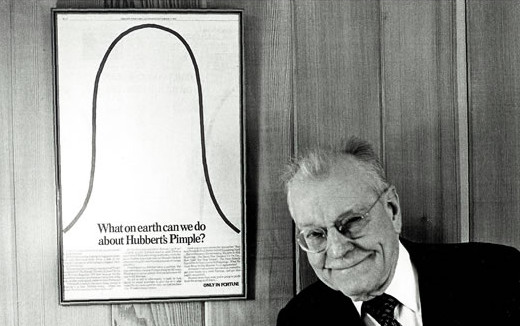Who Are The Flat Earthers Now?

In 1956 geologist M. King Hubbert predicted that American oil production would peak in 1970 and begin to decline. In 1969, when it became clear that his previous prediction would prove inaccurate, Hubbert named 2000 as the new peak year for oil production.
Hubbert, you may be just realizing, was the creator of the now-famous theory of “peak oil.” The bell-shaped curve he used to describe the build-up and the fall-down of oil production became known as Hubbert’s Pimple or Hubbert’s Peak. For decades now Hubbert’s “peak oil” theories have been taken as an article of faith by environmentalists and other activists who want to end America’s use of fossil fuels.
Peak oil is now a trope used in endless films and books set in dystopian futures where America has run out of oil. It’s also been used as the justification for reams of public policy aimed at replacing fossil fuels with other more expensive and less reliable forms of energy like wind, solar, and biofuels.
Even present day academics continue to doubt “peak oil” theories. “Princeton geologist Kenneth Deffeyes has written three whole books in the past decade and a half insisting that peak oil is nigh and disaster will soon follow in its wake,” Reason’s Ronald Bailey writes today noting that Deffeyes refers to those rebutting the theory as “”flat-Earth” prognosticators.
Yet, there’s no question that Hubbert and his theories have been proven wrong over and over again, most recently by the global shale oil revolution which got its start here in America. Oil fields across America, including those here in North Dakota, are helping to increase America’s oil output. The turn-about in domestic oil production has been nothing sort of shocking, as this graph from Professor Mark Perry makes clear:
CHART: Just out from the EIA – US oil production surged to a 43-year high in the first week of June @chartoftheday pic.twitter.com/y3HnylPg9C
— Mark J. Perry (@Mark_J_Perry) June 10, 2015
“Peak oilists always underestimate the power of markets to mobilize human ingenuity,” writes Bailey. Thats been true of all of the disciples of Malthusian resource theories, including Hubbert. These people keep predicting that we will run out of resources like oil and fuel, and yet keep getting better at farming and oil drilling in ways that prove them wrong.
Which illustrates the dangers in unquestioning loyalty to scientific theories. The peak oilists – to use Baileys term – were and are as fanatical in their devotion to their disproven theories as the global warming alarmists are to theirs. They insist on major public policy reforms inspired by their theories, and attack all who dare question them as “flat earthers” and “deniers” and worse.
After all, you do not want to be anti-science, do you?
But our understanding of the world is always evolving, and we should never underestimate the ability of humanity to invent, innovate, and adapt.




